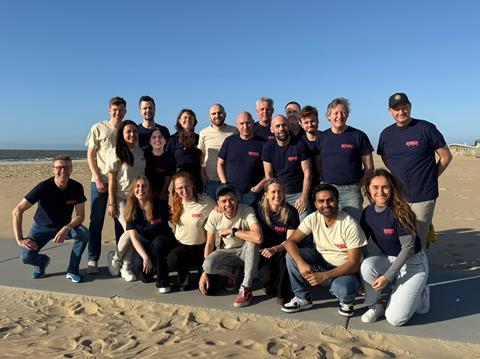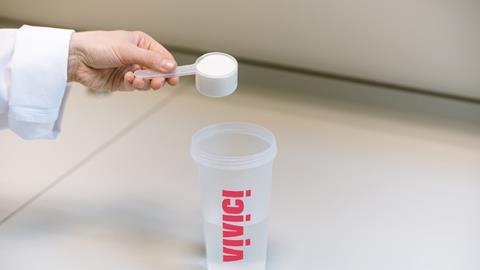Vivici is entering the food market by producing high-quality, sustainable protein through precision fermentation. Founded in 2023, Vivici has already made significant progress. The next step is to convince as many customers as possible. ‘The food business is a business based on trust.’
Vivici was launched in 2023 as a spin-off from a strategic collaboration between DSM (now DSM-Firmenich) and the New Zealand dairy cooperative Fonterra. Both parties already had extensive knowledge of and had conducted significant research into the precision fermentation process, and this start-up was given the opportunity to realise its potential for the food industry. Stephan van Sint Fiet, a biotechnologist with a PhD who gained extensive experience in R&D and commercial roles at various ingredient companies, was approached to establish Vivici as its first employee. ’I even assembled the IKEA tables here myself.’ Now, the team has grown to 20 people, all of whom have a lot of experience in the food industry. ‘We’ve already made most of the mistakes elsewhere, so we don’t have to make them again at Vivici’, says Van Sint Fiet.
One protein
Vivici’s core activity is the production of sustainable dairy protein for use as an ingredient in various food products. To this end, they use precision fermentation to produce whey protein beta-lactoglobulin in yeast. This initial product has recently received FDA approval and is used in protein drinks for children, among other applications. Approval for the European market is still pending.
’The focus is often on the technology, but it should be more about the consumer’
Precision fermentation works in a similar way to other fermentation processes used in the food industry. A key feature of precision fermentation is that the microorganisms — yeast in Vivici’s case — are genetically modified to produce one specific protein rather than a mixture. To make this concept successful and profitable, efficiency is paramount, as the food industry is highly competitive. ’The key is large-scale production using the simplest possible process’, says Van Sint Fiet. Thanks to the purification step and the high precision of the microorganisms, Vivici is able to offer a 99% pure product. According to Van Sint Fiet, it is the purest product on the market.
Sporty
Above all, Vivici aims to produce sustainable dairy protein. And it certainly is sustainable. According to a Life Cycle Analysis, their fermentation process results in around 70% fewer CO₂ emissions, 86% less water consumption, and 90% less soil impact. ‘And that’s not even taking animal welfare into account’, says Van Sint Fiet. This reflects the meaning behind the name Vivici: sustaining life through discovery.
Anyone who visits the website will see that Vivici focuses on sporty, active people. ’This is a consumer group that likes to buy products with lots of good protein’, says Van Sint Fiet. For Vivici, this is an entry-level group. ‘Our dairy protein can be used in much more than just bars and shakes, but it’s important to establish a good reputation first.’ In the future, Vivici will expand its range to include other products to which their protein can be added. A tour of the Vivici office reveals many examples of this. For instance, research is being conducted into ice cream and carbonated drinks with added protein; however, the latter is proving more challenging than anticipated.
[Continue reading below the photo]

Image: Vivici
Sunshine
’The focus is often on the technology, but it should be more about the consumer’, says Van Sint Fiet. This is why it is important for Vivici to be able to explain their product properly. It is a vegan milk protein, but it is not suitable for people with milk allergies. For some, this is a remarkable concept. People with milk allergies choose vegan products, but this is not the case with Vivici’s product. Their precision-fermented protein is not an ’alternative’ protein; it is identical to whey protein from animals. ’We try to explain to our customers, the food producers, how they can use our protein. They can then explain it to their own customers.’
‘Our dairy protein can be used for much more than just bars and shakes.’
Another challenge for Vivici is scaling up production further. This is certainly not easy, but they have not yet encountered any insurmountable obstacles. They already have several production locations in Europe and bioreactors are up and running in the US through a partnership. ‘The sun is shining for Vivici’, says Van Sint Fiet. For the time being, these challenges are not hindering their growth.
In the future, Vivici aims to use its platform to produce many more proteins. ‘We want to create a pipeline that allows us to produce different proteins.’ In addition to technical expertise, this platform also encompasses knowledge of the commercial process. The team is currently investigating a second product: the protein lactoferrin. This iron-binding protein is only available in small quantities in milk, but it has various medical applications. Precision fermentation could increase lactoferrin availability. Van Sint Fiet says, ‘We don’t want to be a one-trick pony.’













Nog geen opmerkingen